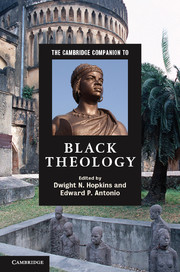Book contents
- Frontmatter
- Part I Introduction
- 1 General introduction
- 2 Historical perspective
- 3 Black theology and liberation theologies
- 4 The social sciences and rituals of resilience in African and African American communities
- 5 Black theology and womanist theology
- Part II Themes in black theology
- Part III Global expressions of black theology
- Further reading
- Index
- Other titles in the series
1 - General introduction
from Part I - Introduction
Published online by Cambridge University Press: 28 September 2012
- Frontmatter
- Part I Introduction
- 1 General introduction
- 2 Historical perspective
- 3 Black theology and liberation theologies
- 4 The social sciences and rituals of resilience in African and African American communities
- 5 Black theology and womanist theology
- Part II Themes in black theology
- Part III Global expressions of black theology
- Further reading
- Index
- Other titles in the series
Summary
Black theology of liberation interweaves three related experiences. “Theology” signifies the long tradition of the various forms of Christianity beginning with the life of Jesus in, what we today call, northeast Africa or west Asia. “Liberation” designates the specific mission of Jesus the Anointed One on earth; that is to say, liberation of oppressed communities to attain power and wealth. And “black” means the multiple manifestations of black people's socially constructed worldviews, aesthetics, and identities. In brief, black theology of liberation answers the question: how does Jesus' Gospel of liberation throughout the Christian tradition reveal itself in black culture? Ultimately, arising out of the particularity of the black experience, the goal is to help craft healthy communities and healthy individuals throughout the world.
Rooted in the Christian tradition, following the path of Jesus, and affirming black culture, black theology of liberation derives from both modern and contemporary contexts.
THE MODERN CONTEXT
By “modern context” we mean the historic encounter between European missionaries, merchants, and military, on the one hand, and the indigenous family structures of the darker-skinned communities of the globe (i.e., the greater part of the world), on the other. Bold European explorations made contact with what would later become Africa, Asia, the Caribbean, Latin America, and the Pacific Islands. Depicting these diverse regions as qualitatively different, Europe then forged itself into a normative cartography called “Europe.” The modern context solidified many European nation-states while colonizing, removing wealth from, and stifling the cultural growth of the rest of the world.
- Type
- Chapter
- Information
- The Cambridge Companion to Black Theology , pp. 1 - 18Publisher: Cambridge University PressPrint publication year: 2012
- 2
- Cited by



